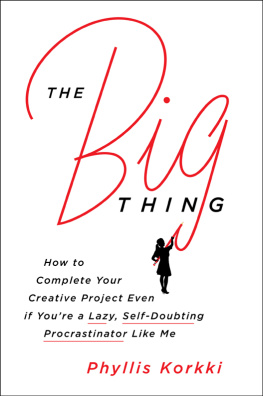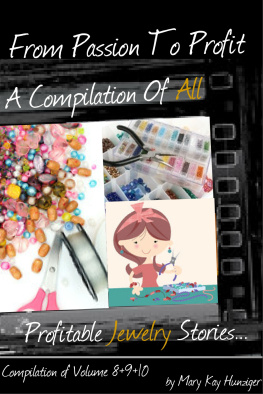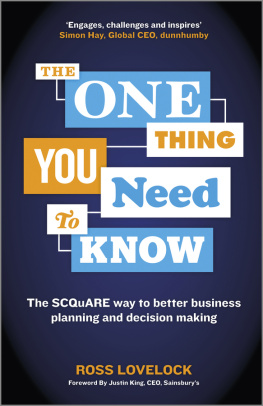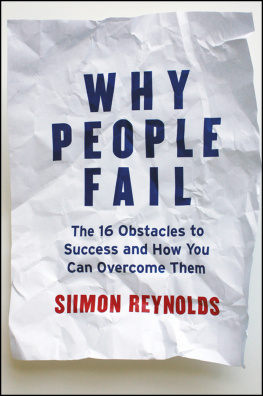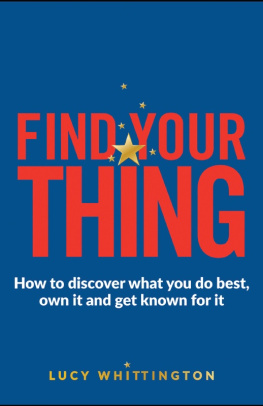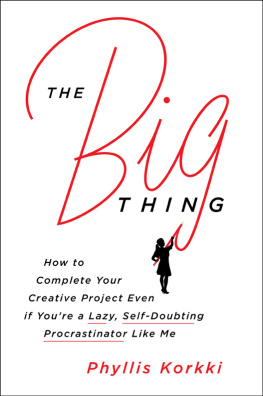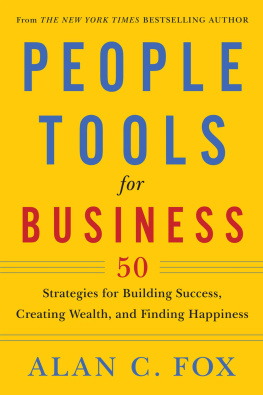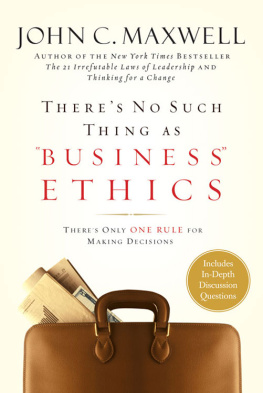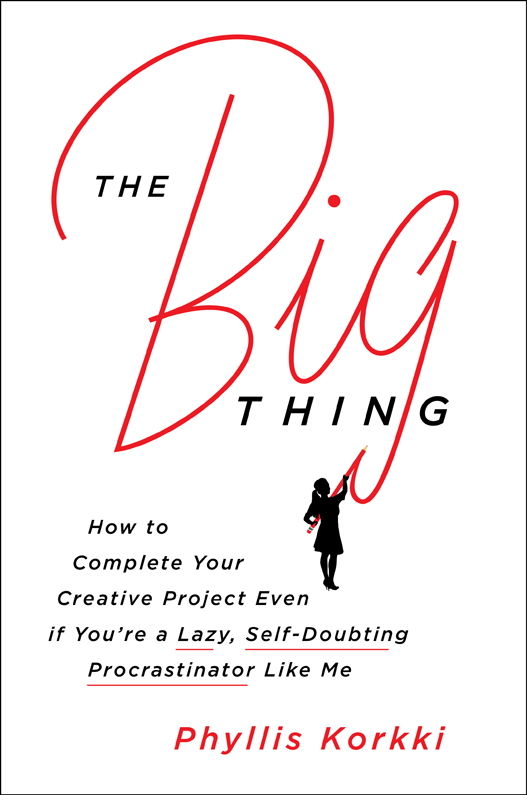I ve wanted to write a book since I was eleven. I wasnt quite sure what it would be about, but it churned vaguely in my mind for about four decades, causing a long-running psychic discontent.
Then a few years ago I wrote a column about deadlines for the New York Times, where I work. Using the column itself as an example of the power of deadlines, I noted that I didnt really get started on it until I announced to my coworkers that I planned to write it and told them exactly when I planned to hand it in.
Unwilling as I was to write the columnhow could I possibly do the topic justice?I completed it on time because I had a deadline. I met the deadline because I would have let my coworkers down and endangered my reputation if I hadnt.
That column got me wondering: How could more people, including me, approach long-term personal projects with that same sense of urgency? Thats when, after a little over forty years of gestation, the topic of my book became clear. The Big Thing of the title refers to a major project that is personally meaningful and requires sustained effort to complete. It requires us to create a unique structure that comes into view slowly as we focus on the individual pieces of it, time after incremental time.
With a Big Thing, we dont normally face the same stakes that we do on the job. We may be too shy to tell other people about our creative goal, so no one even knows to expect something. If we do tell others, they may show polite or even genuine interest. But these people are not going to demand that we hand in our project at a certain time. Thats what makes it so hard.
But thats also what makes it so important. Big Things arent decided by employers or clients. They come from deep inside us, and reflect our personal talents, values, and points of view. They are a way for us to order our experience, and to connect and amplify the moments of our lives. But too often they remain obscured by the demands and distractions of everyday life, and by fears of failure.
How, I wondered, can people raise the importance of their Big Things in their own minds to the point that they actually pursue and complete them? Maybe, I thought, I could find the answer by writing this book.
Like that column on deadlines, this book is a meta book. It is a big creative project about the desire and struggle to complete big creative projects. This conceitboth in the sense of ingeniously contrived and having or showing an excessively high opinion of oneselfmakes me a little uncomfortable. But I decided that the best way to approach this topic would be to live it myself, and to analyze not only my own experience but that of many others who have pursued Big Things. On the way, Ill debunk some myths about creativity, go down some quirky and unexpected paths as I tie creativity to the human condition, and provide insights from myself and others.
Some people insist that you should only create if you cant not do itthat the creative fire must burn so intensely that you feel driven to work on your project at all costs. Others say you must have an iron will and work on your project each and every day at a set time, whether you feel inspired or not. Im here to say that this is simply not true. Only a small percentage of the population possesses that kind of inner fire and discipline.
The rest of us with big creative dreams may be intermittent and unsure in our attempts. We may procrastinate and make excuses and allow ourselves to be distracted by more fleeting concerns. But the goal in our minds still has value, and in our own way we are committed to it. So how can we remove the obstacles that prevent us from achieving it?
In the course of my research, I met and learned about creative people who did have that unrelenting fire. Many others did not, and yet they still managed to persist with their projects. I talked to people who endured major obstaclesthings like mental and physical illness, severe sleep disorders, and addiction. I also met people who faced the common challenges of self-doubt, busy work schedules, and family obligations, and somehow carved a path to completioneven if the final product did not turn out the way they had planned, nor happen as soon.
This is what I found: just as each persons creative project was personal and unique, so was their way of working on it. And that was true for me, too.
In talking to these people and analyzing my own experience, I also came to appreciate the value of constraints. Each person who works on a Big Thing experiences limits that can be accepted and also harnessed. Even if the limits seem to be negative, they can be transformed into something positive.
As I embarked on a journey to complete my own Big Thing, I started with the basics: my own physical being. I took lessons in posture, breathing, and meditation to create a sense of inner expansiveness, to ward off anxiety, and to become aware of a Big Thing as an experience in time. I also gave my sleeping and dreaming life its mysterious due.
As I learned about these things, I discovered that working on a big creative project is as much about not doing as about doing. You need to give your Big Thing, and yourself, a break throughout the processboth literally and figuratively. That break could be temporal and end up lasting for decades, as it did for me because my chronological age had not yet aligned with my purpose. Or it could be psychological in that you need to forgive yourself for stopping and know that you can always return. Or the break could be permanent because your reasons for wanting to do this thing were misplaced.
Whats crucial is that you must, in the main, love doing this thing for its own sakenot for some external reward you may or may not receive because of it. Yes, the experience of working on it will be hard and unpleasant at times, but because the rewards are mainly intrinsic, it is worth doing. In a similar way that we love and commit to another person, despite rough spots in the relationship, we love and commit to a Big Thing.
The process of researching and writing this book felt very rough and halting. I constantly avoided trading the idealized version in my mind for the imperfect reality that required actual work. I needed the help and encouragement of others to make it to the finish, and learned that most people need help, and sometimes full-scale collaboration, to complete their projects too.
I do have some encouragement to offer readers, but I dont intend to be some kind of self-help guru and give a bunch of pep talks. I believe in the power of negative thinking. Once I decided to proceed with my own project I came to accept that I have terrible habits. I procrastinate, Im lazy (although others would disagree), and I have low energy unless Im under the gun. I put myself down and discount what I have accomplished. You will be right there with me as I deal withand laugh overall these flaws on the way to finishing my own Big Thing, this book.
W hats your Big Thing and why havent you done it?
It could be a book or a script. A painting or a musical work. A new product, a startup company, or a charity. Whatever it is, its a big creative idea of your own devising. But you work on it only fitfully, or you never even start, and the gap between aspiration and completion results in a psychic overhang that is uncomfortable to live with.
Do a little reconnaissance and you will find that many people have a Big Thing lurking in their psyches. A friend of mine wants to write a memoir about growing up as the daughter of a professional wrestler, but she is raising two children, and has a full-time job and no extra time. A composer friend has been trying to finish a musical for the last twenty years, but hes not satisfied with what hes done on his own and has been unable to find the right collaborator. A bartender in my neighborhood has been working on a note-taking app for people with attention deficit disorder, but his own case of ADHD keeps him from finishing it.

